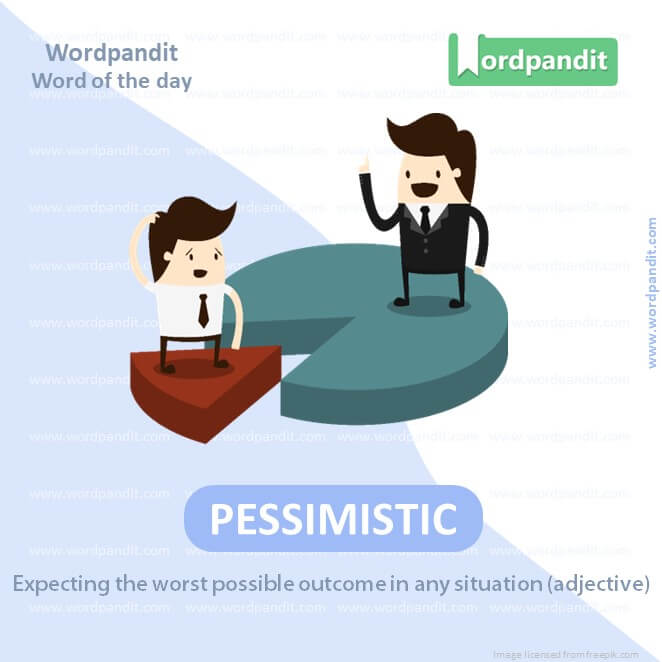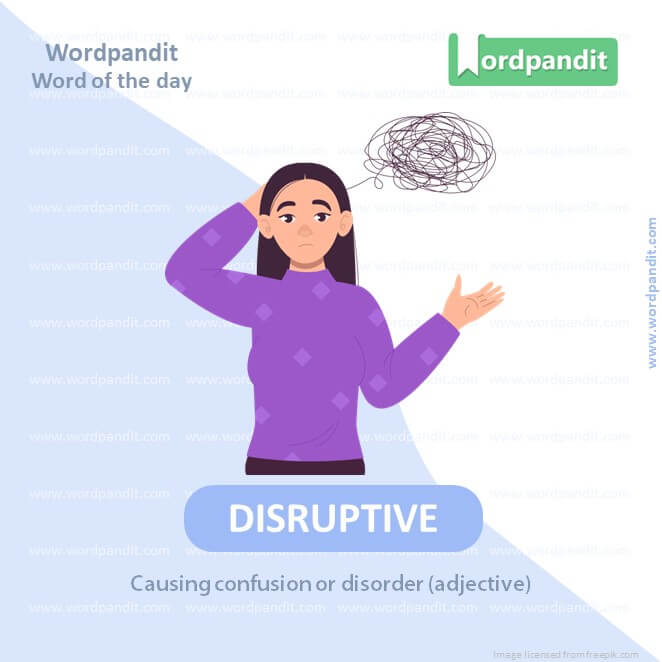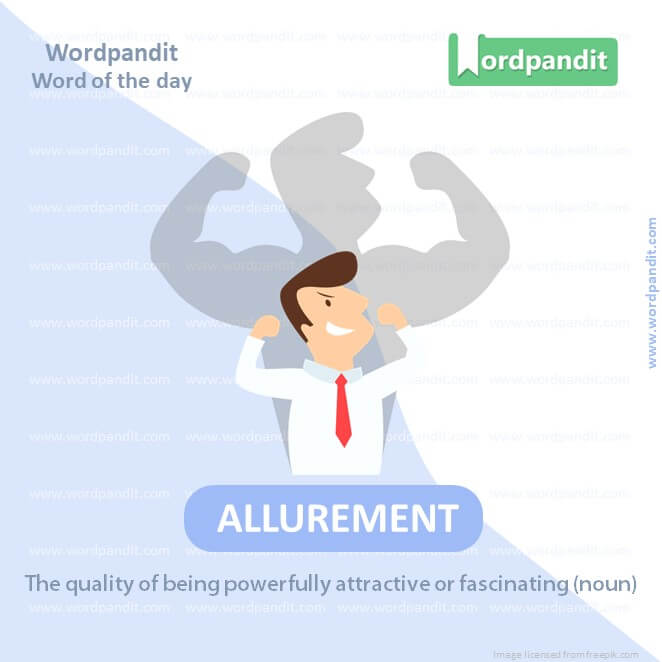Daily Vocabulary Words: List of Daily Used Words
Hi there. Welcome to this special section @ Wordpandit.
Our endeavour here is straightforward: highlighting important daily vocabulary words, you would encounter in The Hindu. This is your repository of commonly used words; essentially, we are posting a list of daily used words. Hence, this has significant practical application as it teaches you words that are commonly used in a leading publication such as The Hindu.
Visit the website daily to learn words from The Hindu.

WORD-1: PESSIMISTIC
CONTEXT: As the trade facilitation body UNCTAD noted in its June 21 ‘Global Trade Update’, the ‘outlook for global trade in the second half of 2023 is pessimistic as negative factors’ including downgraded world economic forecasts, persistent inflation, financial vulnerabilities and geopolitical tensions dominate.
SOURCE: The Hindu
EXPLANATORY PARAGRAPH: Imagine you have a glass of water, and it’s only half-filled. Someone who is “pessimistic” might say, “Oh no, the glass is half empty!” They often think things might not go well or see the not-so-happy side of situations.
MEANING: Expecting the worst possible outcome in any situation (adjective).
PRONUNCIATION: pess-ih-MIS-tik
SYNONYMS: Negative, Cynical, Gloomy, Dismal, Bleak, Hopeless, Downbeat
USAGE EXAMPLE:
1. She was always pessimistic about the future.
2. His pessimistic outlook made it hard for him to see the silver lining.
3. The weather forecast is pessimistic about tomorrow’s rain.
4. I wish you wouldn’t be so pessimistic about the situation.

WORD-2: GEOPOLITICAL
CONTEXT: As the trade facilitation body UNCTAD noted in its June 21 ‘Global Trade Update’, the ‘outlook for global trade in the second half of 2023 is pessimistic as negative factors’ including downgraded world economic forecasts, persistent inflation, financial vulnerabilities and geopolitical tensions dominate.
SOURCE: The Hindu
EXPLANATORY PARAGRAPH: “Geopolitical” is a big word that talks about how countries and their leaders make decisions based on where they are on the map and how they get along with their neighbors.
MEANING: Relating to politics, especially international relations, influenced by geographical factors (adjective).
PRONUNCIATION: gee-oh-puh-LIT-ih-kal
SYNONYMS: International, Diplomatic, Global, Worldly, Territorial, Political, Strategic
USAGE EXAMPLE:
1. The geopolitical situation in the region is tense.
2. Countries make geopolitical decisions based on their location and resources.
3. The rise of new powers changed the geopolitical landscape.
4. Scholars study the geopolitical effects of climate change.

WORD-3: DISRUPTIVE
CONTEXT: The onset of an El Niño, which is historically associated with disruptive weather events, queers the ground further, and ASEAN leaders are justifiably wary.
SOURCE: The Hindu
EXPLANATORY PARAGRAPH: Imagine you’re building a tower with blocks, and someone knocks it over. That’s “disruptive.” It means causing a disturbance or problem that interrupts what’s going on.
MEANING: Causing confusion or disorder (adjective).
PRONUNCIATION: dis-RUPT-iv
SYNONYMS: Disturbing, Troublesome, Chaotic, Disorderly, Interruptive, Upsetting, Distracting
USAGE EXAMPLE:
1. The disruptive student was asked to leave the class.
2. Loud noises can be disruptive during study time.
3. New technologies can be disruptive to old industries.
4. His disruptive behavior upset the entire meeting.

WORD-4: ALLUREMENT
CONTEXT: In Ghosi in Uttar Pradesh, the BJP’s Dara Singh Chauhan lost the election to the Samajwadi Party (SP) candidate. Mr. Chauhan represented a pattern of BJP expansion through defections and allurement.
SOURCE: The Hindu
EXPLANATORY PARAGRAPH: Think about a shiny toy or a yummy candy that makes you really want it. That thing which makes you want it so much is called “allurement.” It’s like a special magic that draws you to it.
MEANING: The quality of being powerfully attractive or fascinating (noun).
PRONUNCIATION: al-LOOR-ment
SYNONYMS: Attraction, Charm, Lure, Enticement, Temptation, Appeal, Seduction
USAGE EXAMPLE:
1. The allurement of the big city drew him in.
2. She couldn’t resist the allurement of the sparkling jewelry.
3. The movie had a certain allurement that made everyone want to watch it.
4. Fairy tales often speak of mysterious allurements in enchanted forests.

WORD-5: COALITION
CONTEXT: The BJP also sought to reinforce its multi-caste Hindu coalition in the by-election, but it did not find favour with voters in the end.
SOURCE: The Hindu
EXPLANATORY PARAGRAPH: Imagine a group of friends coming together to build a big sandcastle. “Coalition” is like that, but for grown-ups. It’s when different groups or people team up because they have a common goal or purpose.
MEANING: A temporary alliance for combined action, especially among political parties (noun).
PRONUNCIATION: co-a-LI-shun
SYNONYMS: Alliance, Union, Partnership, Merger, Collaboration, Confederation, League
USAGE EXAMPLE:
1. The two political parties formed a coalition to pass the law.
2. Several organizations are in a coalition to protect the environment.
3. The coalition government lasted for two years.
4. They joined a global coalition to fight against hunger.
WORD-6: MALPRACTICES
CONTEXT: The CPI(M) has alleged electoral malpractices and violence by the ruling BJP in Tripura.
SOURCE: The Hindu
EXPLANATORY PARAGRAPH: “Malpractices” means doing something wrong or bad, especially by professionals like doctors or lawyers, when they should know better.
MEANING: Improper, illegal, or negligent professional activities or treatment (noun).
PRONUNCIATION: mal-PRAC-ti-ses
SYNONYMS: Misconduct, Wrongdoing, Misdemeanor, Impropriety, Mismanagement, Irregularity, Unprofessionalism
USAGE EXAMPLE:
1. The lawyer was sued for malpractices during the trial.
2. There are strict laws against medical malpractices.
3. She filed a complaint due to the malpractices she experienced.
4. The committee investigates any reports of academic malpractices.
WORD-7: FOSTER
CONTEXT: Parental custody is terminated. The child and its siblings are then placed in foster care for the entirety of their childhood.
SOURCE: The Hindu
EXPLANATORY PARAGRAPH: Imagine you take care of a puppy that’s not yours, like giving it food, love, and a home. That’s called “fostering.” It means taking care of someone or something like it’s your own, even if it’s just for a little while.
MEANING: To encourage the development or growth of ideas or feelings; to take care of someone else’s child in one’s home (verb).
PRONUNCIATION: FOS-ter
SYNONYMS: Nurture, Encourage, Promote, Cultivate, Support, Develop, Advance
USAGE EXAMPLE:
1. They decided to foster a child until she found a permanent home.
2. Teachers foster a love for learning in their students.
3. We should foster an environment of trust and understanding.
4. Her parents always fostered her passion for music.
WORD-8: DINGY
CONTEXT: Contact with parents is either completely barred or limited to one hour every few weeks in a dingy contact centre. Very soon the child is completely alienated from its parents.
SOURCE: The Hindu
EXPLANATORY PARAGRAPH: Imagine a white shirt that’s been played in a lot and has gotten a bit dirty and gray. That’s what “dingy” means. It’s something that looks a bit dirty or not very bright and fresh.
MEANING: Darkened with dirt or grime; not fresh or clean (adjective).
PRONUNCIATION: DIN-jee
SYNONYMS: Grimy, Dirty, Drab, Dull, Tarnished, Muddy, Stained
USAGE EXAMPLE:
1. The room was dingy and needed a fresh coat of paint.
2. She washed the dingy windows until they sparkled.
3. The old book had a dingy cover from years of use.
4. I replaced my dingy shirt with a bright new one.
WORD-9: SANCTIMONIOUS
CONTEXT: Foreign nations should shed their sanctimonious views and engage in a sincere inquiry of the parents’ claims of cultural prejudice and unfair trials in their child protection system.
SOURCE: The Hindu
EXPLANATORY PARAGRAPH: Imagine someone acting like they’re very good and perfect, even if they’re not, and they make sure everyone knows it. That’s being “sanctimonious.” It’s like pretending to be better than everyone else.
MEANING: Making a show of being morally superior to others (adjective).
PRONUNCIATION: sank-ti-MOH-nee-us
SYNONYMS: Self-righteous, Holier-than-thou, Pious, Hypocritical, Smug, Pretentious, Pharisaic
USAGE EXAMPLE:
1. He had a sanctimonious attitude about his charitable work.
2. Her sanctimonious speech annoyed many in the audience.
3. Don’t be sanctimonious; nobody’s perfect.
4. She disliked his sanctimonious tone when discussing morality.
WORD-10: PRELIMINARY
CONTEXT: Though certain categories were carved out to conduct a preliminary inquiry, this was only to ascertain commission of a cognisable offence and not check their truthfulness.
SOURCE: The Hindu
EXPLANATORY PARAGRAPH: “Preliminary” is like the warm-up before a big game. It’s something that comes first or is done to get ready for the main event.
MEANING: Done in preparation or as an introduction to the main action or event (adjective).
PRONUNCIATION: pre-LIM-in-air-ee
SYNONYMS: Initial, Introductory, Starting, First, Opening, Prologue, Preparatory
USAGE EXAMPLE:
1. The teams played a preliminary round before the finals.
2. She did some preliminary research before writing her essay.
3. The meeting was just a preliminary discussion.
4. Preliminary tests showed that the water was clean.
Vocabulary Grammar
Learning a new language encompasses two key aspects: vocabulary and grammar. ‘Vocabulary grammar’ refers to the powerful combination of understanding new words and their usage according to grammatical rules, together creating fluent and accurate language usage. Here’s an effective approach to learning ‘vocabulary grammar’.
At the forefront of ‘vocabulary grammar’ learning is identifying common and practical words. With each new word, understand its part of speech (verb, noun, adjective) to use it correctly in a sentence, adhering to grammar rules. This process ensures that you’re not only building your word reservoir but also leveraging them grammatically.
To solidify ‘vocabulary grammar’, regular reading is vital. When you read, you see new words and their grammatical context. The exposure to ‘vocabulary grammar’ in a natural setting aids in a more intuitive understanding of language.
Another excellent strategy for ‘vocabulary grammar’ is writing exercises. Regular writing using new vocabulary within a grammatical framework helps reinforce both your word knowledge and the grammatical understanding, building confidence and proficiency.
Making use of modern resources can vastly improve the learning process of ‘vocabulary grammar’. Language learning apps, websites, and online courses can offer comprehensive learning materials and exercises combining vocabulary and grammar, thus making learning more interactive and effective.
It’s important to remember that mastering ‘vocabulary grammar’ is a gradual process that requires patience. Regular practice, continual learning of new words, vigorous reading, and writing, as well as consistency, form the ingredients for successful ‘vocabulary grammar’ mastery.
In conclusion, the journey into ‘vocabulary grammar’ learning should be viewed as an exciting adventure towards articulating thoughts and ideas more effectively. With structured learning, application, and a dash of dedication, mastering ‘vocabulary grammar’ can not only be an achievable task but also a fulfilling one.










